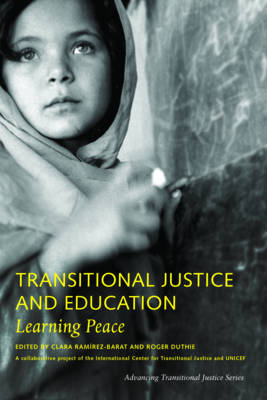
Stock image for illustration purposes only - book cover, edition or condition may vary.
Transitional Justice and Education: Learning Peace (Advancing Transitional Justice)
Clara Ram Rez-Barat
€ 40.52
FREE Delivery in Ireland
Description for Transitional Justice and Education: Learning Peace (Advancing Transitional Justice)
Paperback. Editor(s): Ramirez-Barat, Clara; Duthie, Roger. Num Pages: 424 pages, 9 b&w illustrations. BIC Classification: JNA; JNF; JPQB. Category: (P) Professional & Vocational. Dimension: 155 x 228 x 35. Weight in Grams: 636.
After periods of conflict and authoritarianism, educational institutions often need to be reformed or rebuilt. But in settings where education has been used to support repressive policies and human rights violations, or where conflict and abuses have resulted in lost educational opportunities, legacies of injustice may pose significant challenges to effective reform. Peacebuilding and development perspectives, which normally drive the reconstruction agenda, pay little attention to the violent past. Transitional Justice and Education: Learning Peace presents the findings of a research project of the International Center for Transitional Justice on the relationship between transitional justice and education in peacebuilding contexts. The book examines how transitional justice can shape the reform of education systems by ensuring programs are sensitive to the legacies of the past, how it can facilitate the reintegration of children and youth into society, and how education can engage younger generations in the work of transitional justice.
Product Details
Publisher
Social Science Research Council
Format
Paperback
Publication date
2016
Condition
New
Number of Pages
460
Place of Publication
New York, NY, United States
ISBN
9780911400038
SKU
V9780911400038
Shipping Time
Usually ships in 15 to 20 working days
Ref
99-15
About Clara Ram Rez-Barat
Clara Ramirez-Barat is the director of the Educational Policies Program at the Auschwitz Institute for Peace and Reconciliation. For the past six years her work has focused on the intersection between transitional justice and the public sphere (media, culture, and education), with a focus on prevention. Roger Duthie is a senior associate in the research unit at ICTJ, where he has managed multiyear research projects examining how transitional justice relates to education, forced displacement, and development. His publications include two previous edited volumes on transitional justice.
Reviews for Transitional Justice and Education: Learning Peace (Advancing Transitional Justice)
This edited volume provides a rich set of case studies from some of the world's most intractable conflicts and makes an important contribution to the literature on education, conflict, and peacebuilding. It provides practical examples of the ways that education can contribute to transitional justice-through reparations and by addressing educational inequalities, by engaging children and young people in nonformal education, and, the most difficult challenge of all, by helping successive generations learn about the violent conflicts that have affected their own societies. Essential reading for education and development practitioners.
Alan Smith, Alan Smith, UNESCO Chair in Pluralism, Human Rights and Democracy, Ulster University A crucial addition to work on cultural rights, truth, justice, reconciliation, and nonrecurrence, this collection illustrates the vitality of ensuring multivoice narratives, as stressed in my UN special rapporteur reports on history teaching and memorialization processes. Case studies exploring how education policies can mitigate past injustices or set the pattern for further injustices provide invaluable new insights.
Farida Shaheed, executive director, Shirkat Gah-Women's Resource Centre, Pakistan, and former UN special rapporteur in the field of cultural rights Transitional justice processes seek to promote social healing in the aftermath of armed violence and authoritarian repression. Transitional Justice and Education: Learning Peace shows the decisive role that schools can play in that healing process through the transformation of our values and our moral imagination. This book presents a deep understanding of the connection between education and peace and provides a rich variety of examples that will undoubtedly strengthen our capacity to build peace upon truth, memory, and justice.
Salomon Lerner Febres, executive president, Institute for Democracy and Human Rights, Pontifical Catholic University of Peru, and former president of the Truth and Reconciliation Commission of Peru
Alan Smith, Alan Smith, UNESCO Chair in Pluralism, Human Rights and Democracy, Ulster University A crucial addition to work on cultural rights, truth, justice, reconciliation, and nonrecurrence, this collection illustrates the vitality of ensuring multivoice narratives, as stressed in my UN special rapporteur reports on history teaching and memorialization processes. Case studies exploring how education policies can mitigate past injustices or set the pattern for further injustices provide invaluable new insights.
Farida Shaheed, executive director, Shirkat Gah-Women's Resource Centre, Pakistan, and former UN special rapporteur in the field of cultural rights Transitional justice processes seek to promote social healing in the aftermath of armed violence and authoritarian repression. Transitional Justice and Education: Learning Peace shows the decisive role that schools can play in that healing process through the transformation of our values and our moral imagination. This book presents a deep understanding of the connection between education and peace and provides a rich variety of examples that will undoubtedly strengthen our capacity to build peace upon truth, memory, and justice.
Salomon Lerner Febres, executive president, Institute for Democracy and Human Rights, Pontifical Catholic University of Peru, and former president of the Truth and Reconciliation Commission of Peru
